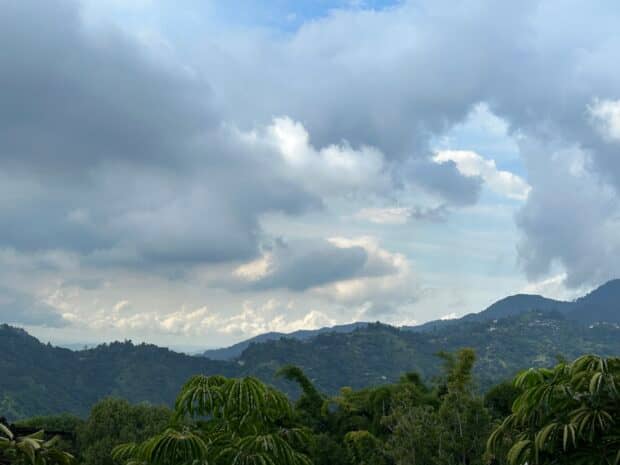The mystique of the Blue Mountains in Jamaica is tangible. Curvy roads about an hour outside of Kingston wind upward into the mountains until you can literally touch the clouds.
Forming from the steep rise of the mountains from sea level, those clouds are what provide the ideal amount of shade for the world famous Blue Mountain coffee trees.
I was recently invited to go on a coffee buying trip with the folks from Blue Mountain Coffee Inc., roasters and United States importers of Blue Mountain-grown coffees.
Blue Mountain Coffee Inc. Founder Edgar Munn has deep roots in Jamaican coffee, spending much of his life in the island’s coffeelands after he was born in Kingston in 1948. Munn continues to roast Blue Mountain coffee from his roastery outside of Atlanta, alongside business partner Chuck Holmgreen.
Here are some of the highlights of my excursion with Munn and Holmgreen into Jamaica’s renowned Blue Mountain region:
Day 1 – Flamstead Estate
High above Kingston, Stephen Dunkley’s family-owned farm, Flamstead Estate, is named for the sub-region in which it sits. Dunkley began farming in 2016.
We are visiting during the opening of the reaping season — the term used for picking in Jamaica — so the trees are heavy with ripening coffee. Our visit coincided with a national holiday, Heroes’ Day, so the farm was largely quiet.
Dunkley, who is also an artist, creates a “painting experience” for his guests. We all drink coffee and try to channel our awe of the surroundings into something resembling fine art (not pictured: my painting).
Day 2 – Trumpet Tree Coffee Factory
After another short drive from Kingston to the Blue Mountains, we arrive at Trumpet Tree Coffee Factory. Although the activity at Trumpet Tree is at peak harvest pace, we are boisterously greeted by the farm owner Arthur McGowen, whose friendship with Munn goes back years.
A truckload of cherry arrives, and McGowen moves it to the pulper using an industrial tractor. The coffee is pulped, loaded into another truck and moved to the driers. The coffee is then dried and put into bags for milling.
We move into the main office to see the roasting room, and of course find another intersection of art and coffee: a set of steel drums in front of the roaster. McGowen starts to play and the he room comes alive. He hands the sticks to me and I try my hand at the instrument for a minute before McGowen flies off to another task on the farm.
Day 3 – Sir John’s Peak Estate and the Jamaica Coffee Growers Association
Donald Salmon, owner of Sir John’s Peak Estate, and Dorienne Rowan-Campbell, owner of Rowan’s Royale Coffee.
We start the day with Donald Salmon from Sir John’s Peak Estate driving us into the mountains. Curve after curve the drive eventually leads to Sir John’s Peak, where approximately 25 farmers from the surrounding region have gathered.
The farmers are part of the Jamaica Coffee Growers Association, which was established in 1995 as a way to represent farmers’ interests. The Association is led by Salmon and Dorienne Rowan-Campbell from Rowan’s Royale Coffee, the only organic-certified coffee farm on the island.
The farmers have organized a cookout on the mountain complete with jerk chicken cooked in a homemade metal grill and a spread of homemade foods. As the farmers address concepts such as trust-building and preservation of the local coffee industry, their passion becomes palpable.
Day 4 – Clifton Mount Estate
Day four takes us somewhat deeper into the mountains to the Clifton Mount Estate. The 300-year-old Clifton House sits on the edge of a mountaintop, looking out to all seven major peaks of the Blue Mountains.
The farm is perfectly organized by brothers Jason and Richard Sharp, who’s goal is to produce large amounts of “the best coffee in the world.” The brothers have studied coffee processing around the globe to learn the latest best post-harvest processing methods. They diligently worked to increase production, becoming the largest coffee processor on the island.
The cherries from yesterday’s picking have already been pulped and loaded back into a truck. The truck will then head down the mountain to Kingston, where they will be dried, hulled and made ready for export. Our last task before heading back to Kingston was to plant a coffee tree with my name on it — an incredibly humbling honor from such a magnificent farm.
Clifton Mount Estate Owners Richard and Jason Sharp along with Roast magazine Publisher Connie Blumhardt.
Everywhere we traveled in Jamaica’s enthralling Blue Mountains, the people were warm, passionate and hard working — each bringing their own personality and approach to what all Jamaican farmers like to call “the best coffee in the world.”
Connie Blumhardt Connie Blumhardt is the founder and publisher of Roast Magazine. She is based in Portland, Oregon.


